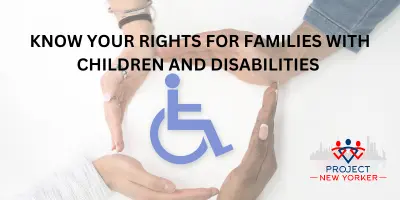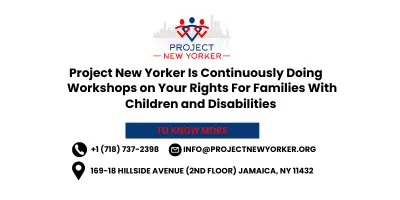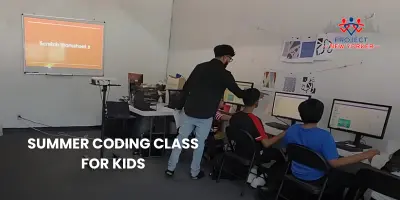Know Your Rights For Families With Children and Disabilities in United States

Knowing about our rights is vital for families with children and disabilities. Knowledge empowers you to advocate effectively for your child’s needs.
In united states, Laws and regulations exist to protect and support families, but knowing how to access these rights can be challenging. In this blog post we aims to shed light on the essential rights and resources available to you.
If it’s about education, healthcare, or daily living, being informed helps you make the best decisions for your family. We’ll break down the key rights and provide practical tips to help you navigate this journey. Let’s dive in and empower your family with the information you need.
Introduction To Rights
Families with children who have disabilities often face unique challenges. Understanding your rights can make a significant difference. Knowledge empowers us to advocate effectively for child’s needs. This section provides an introduction to these rights, helping you navigate the system with confidence.
Importance Of Knowing Rights
Knowing your rights is crucial for several reasons. It ensures that your child receives the support and services they are entitled to. This knowledge can also prevent misunderstandings and conflicts with schools, healthcare providers, and other institutions.
Here are some key benefits of knowing your rights:
- Access to Services: Understanding your rights helps you access necessary services for your child, such as special education and healthcare.
- Advocacy: Being informed enables you to advocate effectively for your child’s needs and ensure they receive proper care and support.
- Legal Protection: Knowing your rights protects your family from discrimination and ensures equal opportunities for your child.
Below is a table highlighting some essential rights and their benefits:
| Right | Benefit |
|---|---|
| Free Appropriate Public Education (FAPE) | Ensures your child receives tailored education at no cost. |
| Individualized Education Program (IEP) | Provides a customized learning plan to meet your child’s specific needs. |
| 504 Plan | Offers accommodations to support your child’s learning and participation. |
Impact On Families
Knowledge of rights has a profound impact on families. It can bring peace of mind, knowing that your child is receiving the support they need. This understanding can also reduce stress and anxiety for parents, as they navigate the complex world of disability services.
Here are some ways knowing your rights positively affects families:
- Improved Quality of Life: Access to appropriate services and support improves your child’s overall quality of life.
- Enhanced Communication: Being informed fosters better communication with educators, healthcare providers, and other professionals.
- Empowerment: Knowledge empowers parents to make informed decisions and take control of their child’s care and education.
In summary, understanding your rights not only benefits your child but also strengthens your family’s ability to advocate and care for their needs effectively.
Disability Rights Laws
Knowing our rights can be crucial for families with children who have disabilities. Disability Rights Laws are designed to ensure that these children have equal opportunities and access to necessary resources. Knowing these laws helps families advocate for their child’s needs in education, public spaces, and more. Two key laws that support families with children with disabilities are the Americans with Disabilities Act (ADA) and the Individuals with Disabilities Education Act (IDEA).
Americans With Disabilities Act
Americans with Disabilities Act (ADA) is a vital piece of legislation that protects the rights of individuals with disabilities. This law ensures that people with disabilities have the same opportunities as everyone else. It covers several areas including employment, public accommodations, transportation, and government services.
Key points of the ADA include:
- Employment: Employers must provide reasonable accommodations to employees with disabilities, as long as it does not cause undue hardship to the business.
- Public Accommodations: Facilities like schools, parks, and stores must be accessible to individuals with disabilities.
- Transportation: Public transportation systems must be accessible to people with disabilities. This includes buses, trains, and other forms of public transit.
- Government Services: State and local governments must ensure that their services, programs, and activities are accessible to individuals with disabilities.
These provisions ensure that children with disabilities can participate fully in society. Families can use the ADA to advocate for changes when they encounter barriers. Accessibility laws like the ADA are essential in promoting equal opportunity and inclusion for all.
Individuals With Disabilities Education Act
Individuals with Disabilities Education Act (IDEA) is a law that ensures children with disabilities receive a free appropriate public education. This law focuses on special education and related services designed to meet the unique needs of these children. The goal is to prepare them for further education, employment, and independent living.
Key provisions of IDEA include:
- Free Appropriate Public Education (FAPE): Every child with a disability has the right to an education that meets their individual needs.
- Individualized Education Program (IEP): Each eligible child must have an IEP. This document outlines the child’s learning needs, the services the school will provide, and how progress will be measured.
- Least Restrictive Environment (LRE): Children with disabilities should learn alongside their non-disabled peers to the maximum extent appropriate.
- Parent Participation: Parents have the right to be involved in the decision-making process regarding their child’s education.
- Procedural Safeguards: Parents and children have rights to ensure that schools follow the law and provide appropriate education.
These provisions help ensure that children with disabilities receive an inclusive education. Families can use IDEA to ensure their children get the necessary support and services. Special needs resources and family support services can further assist in navigating these legal protections for families.

Educational Rights
Families with children and disabilities have specific educational rights to ensure that their children receive the necessary support and accommodations for their learning needs. Understanding these rights can help families advocate for their children effectively. This section focuses on the educational rights, particularly through Individualized Education Programs (IEPs) and 504 Plans, and the access to various resources available.
Iep And 504 Plans
Children with disabilities are entitled to an Individualized Education Program (IEP) or 504 Plan, based on their specific needs. These plans provide tailored support and accommodations to ensure that children can access the same educational opportunities as their peers.
IEP (Individualized Education Program):
- An IEP is a legal document developed for a child eligible for special education.
- It includes specific educational goals, services, and supports required for the child.
- Parents, teachers, and specialists collaboratively create the IEP.
- Regular reviews and updates ensure the program meets the child’s evolving needs.
504 Plan:
- A 504 Plan provides accommodations for students with disabilities to ensure their academic success.
- It is not as detailed as an IEP but still offers significant support.
- 504 Accommodations might include extended test time, modified assignments, or physical accessibility aids.
- Schools must adhere to these plans under Section 504 of the Rehabilitation Act.
Both IEPs and 504 Plans are crucial for promoting inclusive education and ensuring that children with special needs receive the appropriate educational support.
Access To Resources
Families must know the various resources available to support their children’s education. These resources can provide valuable assistance and improve the learning experience for children with disabilities.
Disability Resources:
- Many schools have dedicated staff for special needs assistance.
- Local and national organizations offer guidance and support.
- Online resources and communities can provide additional help and information.
Legal Protections for Children:
- Children with disabilities are protected under various laws, such as the Individuals with Disabilities Education Act (IDEA).
- These laws ensure equal access to education and prevent discrimination.
- Families can seek assistance from disability advocacy groups for legal support.
Educational Support:
- Schools must provide necessary accommodations and modifications.
- Special education services, such as speech therapy or occupational therapy, are often available.
- Parents can request evaluations to determine the best support for their child.
Accessing these resources empowers families to advocate for their children’s special education rights, ensuring that their educational journey is as smooth and successful as possible.
Health Care Rights
Families with children and disabilities face unique challenges. Knowing your rights can help navigate these challenges, especially in health care. Understanding Health Care Rights ensures your child receives the necessary medical attention and support.
Insurance Coverage
Insurance coverage is vital for families with children and disabilities. It ensures access to necessary treatments and support services. Here are some key points to consider:
- Insurance For Children: Ensure your child is covered under a comprehensive plan. This includes routine check-ups, medications, and emergency care.
- Support Services For Disabilities: Many insurance plans offer additional services for children with special needs. These can include physical therapy, occupational therapy, and speech therapy.
- Legal Rights For Families: Familiarize yourself with your legal rights. This can help you navigate disputes with insurance providers and ensure your child gets the care they need.
Understanding your insurance policy is crucial. Here’s a table to help you know what to look for:
| Service | Coverage |
|---|---|
| Routine Check-ups | Included |
| Medications | Included |
| Therapies | Depends on Plan |
| Emergency Care | Included |
Always review your insurance policy carefully. Look for any special provisions or exclusions related to disabilities. You may also want to consult with an advocacy for families group. They can provide guidance and support in understanding your rights and benefits.
Access To Specialists
Access to medical specialists is crucial for children with special needs. Medical specialists for children can provide targeted care and support. Here are some steps to ensure your child gets the specialist care they need:
- Consult with your primary care physician. They can refer you to the necessary specialists.
- Check your insurance policy. Ensure it covers visits to specialists.
- Research local specialists. Look for those experienced in treating your child’s specific disability.
It’s also important to understand the types of specialists available:
- Pediatric Neurologists: Treat neurological conditions in children.
- Pediatric Cardiologists: Specialize in heart conditions in children.
- Developmental Pediatricians: Focus on developmental issues and disabilities.
Here’s a quick reference table:
| Specialist | Focus Area |
|---|---|
| Pediatric Neurologist | Neurological Conditions |
| Pediatric Cardiologist | Heart Conditions |
| Developmental Pediatrician | Developmental Issues |
Getting the right specialist is essential for effective treatment. Ensure your child has access to the best care available. Healthcare access is a right for all families, especially those with children with special needs. By knowing your rights and understanding the available resources, you can better advocate for your child’s health and well-being.
Employment Rights
Understanding your employment rights is crucial for families with children and disabilities. Knowing your rights can help ensure fair treatment in the workplace. Families with disabilities often face unique challenges. Legal protections for children, parents, and caregivers are essential. This guide will help you navigate those rights.
Job Accommodations
Job accommodations are modifications or adjustments to a job or work environment. These changes enable employees with disabilities to perform their duties effectively. For families with children and disabilities, it is vital to understand the types of accommodations available.
Workplace accommodations can include:
- Flexible work schedules
- Remote work options
- Modified job duties
- Physical adjustments to the workspace
- Provision of special equipment or technology
These accommodations aim to create an inclusive work environment. Employers are required to provide reasonable accommodations under the Americans with Disabilities Act (ADA). This law applies to businesses with 15 or more employees.
Here is a table showing common accommodations and their benefits:
| Accommodation | Benefit |
|---|---|
| Flexible work schedule | Allows parents to manage medical appointments |
| Remote work | Reduces stress and travel time |
| Modified job duties | Ensures tasks are manageable |
| Special equipment | Improves productivity and accessibility |
Understanding these accommodations can help parents advocate for their needs. Family support services can provide additional resources and guidance.
Anti-discrimination Protections
Anti-discrimination protections are in place to prevent unfair treatment based on disability. The ADA and other accessibility laws ensure equal opportunities for all employees. These laws protect families with disabilities from workplace discrimination.
Disability discrimination can take many forms, such as:
- Unfair hiring practices
- Denial of reasonable accommodations
- Harassment or bullying
- Unjust termination
If you believe you have faced discrimination, there are steps you can take:
- Document the incidents
- Report the issue to your employer
- File a complaint with the Equal Employment Opportunity Commission (EEOC)
- Seek legal advice
These steps can help you protect your rights and seek justice. Parental rights and special education rights are also protected under these laws. Inclusive education and workplace accommodations are essential for creating a supportive environment.
Resources for families with disabilities are available to help navigate these challenges. Understanding your rights can empower you to advocate for fair treatment. Legal protections for children and parents ensure a supportive workplace for all.
Public Services Access
Families with children and disabilities often face unique challenges. One of the most crucial areas is understanding public services access. Knowing your rights can make a significant difference. This includes access to transportation services and community programs designed to support your family.
Transportation Services
Access to transportation is essential for families with children and disabilities. It enables mobility and independence. Here are some key points to consider:
- Public Transit: Many cities offer accessible buses and trains. These services are equipped with ramps, lifts, and designated seating.
- Paratransit Services: These are specialized transportation options. They cater to individuals who cannot use regular public transit due to their disabilities. Booking is usually required in advance.
- Reduced Fares: Families with children and disabilities may qualify for reduced fares or free passes. Check with your local transit authority for details.
Below is a table summarizing different transportation services and their features:
| Service Type | Features | Eligibility |
|---|---|---|
| Public Transit | Ramps, lifts, designated seating | All individuals, priority for disabled |
| Paratransit Services | Specialized vehicles, door-to-door service | Individuals with significant disabilities |
| Reduced Fares | Discounted or free passes | Varies by region, typically disabled and low-income |
Community Programs
Community programs play a vital role in supporting families with children and disabilities. These programs offer various services and activities:
- Recreational Activities: Many communities offer adaptive sports and leisure activities. These are tailored to children with disabilities.
- Support Groups: These groups provide a platform for families to connect. Sharing experiences and advice can be incredibly beneficial.
- Educational Workshops: Workshops and seminars can help families navigate challenges. Topics may include special education rights and advocacy.
Here is a list of common community programs and their benefits:
- Adaptive Sports: Promote physical health and social interaction.
- Support Groups: Emotional support and resource sharing.
- Educational Workshops: Knowledge and skills for better advocacy.
Being aware of these programs can greatly enhance the quality of life for your child and family. They provide essential support, resources, and opportunities for engagement.
Advocacy And Support
Having a child with disabilities can be a journey filled with both challenges and triumphs. Understanding your rights and finding the right support is crucial. Advocacy and support networks can make a significant difference in ensuring your child receives the necessary care and opportunities. Let’s explore ways to find these vital resources.
Finding Support Groups
Support groups offer a community where families can share experiences, advice, and encouragement. Connecting with other families who understand your situation can be incredibly beneficial. Here are some ways to find these groups:
- Local Community Centers: Many community centers host support groups for families with children who have disabilities. Check their bulletin boards or websites for meeting times.
- Schools: Schools often have resources and connections to support groups tailored for parents of children with special needs.
- Online Forums: Websites like Parenting.com and Understood.org offer forums where parents can connect and share advice.
- Social Media: Platforms like Facebook have numerous groups dedicated to specific disabilities. Simply searching for a relevant group can yield many results.
Support groups not only provide emotional backing but can also be a source of practical advice. Parents can learn about new therapies, educational strategies, and local resources from others who have faced similar challenges.
Legal Aid Resources
Understanding the legal rights of your child is crucial. Legal aid resources can help families navigate complex regulations and ensure that their children receive the support they need. Here are some resources to consider:
- Legal Aid Societies: Organizations like the Legal Aid Society offer free or low-cost legal assistance to families in need. They can help with issues such as securing accommodations in schools or accessing disability benefits.
- Special Education Advocates: These professionals understand education laws and can assist in creating Individualized Education Programs (IEPs) and ensuring schools comply with legal requirements.
- Disability Rights Organizations: Groups such as the National Disability Rights Network provide legal resources and advocacy to protect the rights of individuals with disabilities.
- Pro Bono Services: Many law firms offer pro bono services for families with children who have disabilities. These services can be invaluable for those who cannot afford legal representation.
Access to these resources can be life-changing. Families can advocate more effectively for their children and ensure they receive the appropriate support and accommodations. Keeping informed about legal rights and available resources empowers families to make the best decisions for their children’s well-being.
Common Challenges
Families with children and disabilities often face a unique set of challenges. Understanding your rights is crucial. This knowledge can help navigate complex systems and combat discrimination. Common challenges include dealing with bureaucratic systems and facing societal prejudices. Let’s explore these issues in more detail.
Navigating Systems
Families often struggle with navigating different systems. These include healthcare, education, and social services. Each system has its own rules and procedures. Knowing how to work within these systems is vital.
Here are some key points to consider:
- Healthcare: Understanding insurance coverage and knowing what services are available can be overwhelming. It’s important to ask for help from case managers or social workers.
- Education: Schools must provide appropriate support for children with disabilities. This includes Individualized Education Plans (IEPs) and access to special education resources.
- Social Services: Families may be eligible for various support programs. These can include financial assistance, respite care, and therapy services.
Below is a table that summarizes key contacts for each system:
| System | Key Contact | Role |
|---|---|---|
| Healthcare | Case Manager | Helps coordinate care and services |
| Education | School Counselor | Supports educational needs and plans |
| Social Services | Social Worker | Provides access to support programs |
Facing Discrimination
Discrimination is another common challenge. Families may face biases from different sources. This can include schools, workplaces, and even the community. Discrimination can take many forms. It can be overt or subtle.
Here are some examples of discrimination:
- In Schools: Children with disabilities may be unfairly excluded from activities. They may also receive inadequate support.
- In Workplaces: Parents may face difficulties in balancing work and caregiving. Employers may not offer flexible schedules.
- In Communities: Families may encounter negative attitudes. They might also face a lack of accessibility in public spaces.
Families can take steps to address discrimination:
- Know Your Rights: Familiarize yourself with laws that protect against discrimination. This includes the Americans with Disabilities Act (ADA) and the Individuals with Disabilities Education Act (IDEA).
- Advocate: Speak up when you encounter discrimination. Document incidents and seek support from advocacy groups.
- Educate: Raise awareness in your community. Share information about disabilities and the importance of inclusion.
Facing these challenges is not easy. But being informed and proactive can make a difference. By knowing your rights, you can better support your family and advocate for positive change.
Conclusion And Resources
Understanding the rights for families with children and disabilities is crucial. This knowledge empowers families and ensures that children receive the necessary support and services. In this section, we’ll summarize key takeaways and provide helpful contacts to assist you in navigating these rights.
Key Takeaways
Families with children who have disabilities need to be aware of their rights. Here are some important points to remember:
- Individualized Education Programs (IEP): Every child with a disability is entitled to a tailored education plan. This plan should meet their unique needs.
- Access to Public Services: Children with disabilities have the right to access public services such as healthcare and transportation.
- Anti-Discrimination Laws: Laws like the Americans with Disabilities Act (ADA) protect children from discrimination based on their disabilities.
- Parental Involvement: Parents have the right to be involved in the decision-making process regarding their child’s education and care.
Additionally, understanding these rights helps in advocating for your child effectively. Families should always seek to understand and utilize available resources. This helps to ensure that their child receives the best possible support.
Helpful Contacts
Having access to the right contacts can make a significant difference. Here are some helpful contacts for families with children and disabilities:
- National Disability Rights Network (NDRN): ndrn.org
- Parent Training and Information Centers (PTIs): These centers provide assistance and information on special education rights. Find a local PTI here.
- Office of Special Education Programs (OSEP): osep.ed.gov
For more personalized support, consider reaching out to local advocacy groups. Here is a table with some state-specific resources:
| State | Resource | Contact |
|---|---|---|
| California | Disability Rights California | disabilityrightsca.org |
| New York | Advocates for Children of New York | advocatesforchildren.org |
| Texas | Texas Parent to Parent | txp2p.org |
These resources can help you get the support you need. Stay informed and connected with these organizations to better advocate for your child’s rights.
Frequently Asked Questions
What Rights Do Families With Disabled Children Have?
Families with disabled children have the right to accessible education, healthcare, and social services. They can request reasonable accommodations and support in schools. Laws like IDEA and ADA protect their rights.
How Can Families Ensure Accessible Education?
Families should collaborate with schools to develop an Individualized Education Program (IEP). They can request evaluations and accommodations. Advocacy groups can provide additional support and resources.
What Financial Support Is Available?
Families may qualify for financial support through programs like SSI, Medicaid, and tax credits. Local and national organizations also offer grants and assistance.
Can Families Request Reasonable Accommodations?
Yes, families can request reasonable accommodations in schools and public places. The ADA ensures that necessary modifications are provided.
Conclusion
Knowing your rights is crucial for families with children and disabilities. It empowers you to advocate effectively. Understanding legal protections helps ensure your child’s needs are met. Stay informed, ask questions, and seek support when needed. Connect with local resources for guidance and assistance.
Remember, you are not alone in this journey. Every step you take makes a difference. Protecting your child’s rights is key to their well-being and success. Advocate confidently, stay informed, and support your family’s unique needs.



